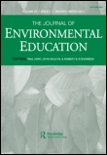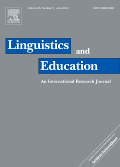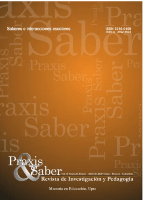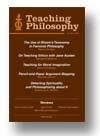
JOURNAL OF ENVIRONMENTAL EDUCATION
Scope & Guideline
Exploring the Nexus of Education and Ecology
Introduction
Aims and Scopes
- Interdisciplinary Approaches to Environmental Education:
The journal promotes research that intersects various disciplines, including ecology, sociology, and education, to create holistic educational strategies for environmental awareness. - Indigenous Knowledge and Education:
A significant focus is placed on integrating Indigenous perspectives and knowledge systems into environmental education, emphasizing the importance of local contexts and cultural relevance. - Critical Pedagogy and Social Justice:
The journal encourages exploration of critical pedagogy frameworks that address social justice issues within environmental education, aiming to empower marginalized communities and promote equity. - Innovative and Experiential Learning:
Research that explores innovative, experiential, and place-based learning strategies is central, highlighting hands-on approaches that engage learners directly with their environments. - Ecological Literacy and Sustainability:
The journal emphasizes the development of ecological literacy among learners, fostering an understanding of sustainability and environmental stewardship as key educational outcomes.
Trending and Emerging
- Multispecies and More-than-Human Pedagogies:
A growing body of research is exploring multispecies relationships and more-than-human pedagogies, emphasizing interconnectedness and the role of non-human entities in educational contexts. - Climate Change Education and Activism:
There is an increasing focus on climate change education, particularly in relation to youth activism and engagement strategies, reflecting a broader societal urgency around climate issues. - Decolonization in Environmental Education:
Emerging studies are prioritizing decolonization efforts within environmental education, seeking to dismantle colonial legacies and promote Indigenous knowledge systems and practices. - Digital and Technological Integration:
Research is trending towards the integration of digital technologies in environmental education, exploring how these tools can enhance learning experiences and accessibility. - Emotional and Affective Dimensions of Learning:
There is a rising interest in the emotional and affective aspects of environmental education, focusing on how feelings and relationships with the environment influence learning and engagement.
Declining or Waning
- Traditional Environmental Education Models:
There is a noticeable decline in research centered around traditional environmental education models that emphasize rote learning and standardized curricula, as newer, more dynamic approaches gain traction. - Focus on Individual Behavior Change:
Themes that solely focus on individual behavior change without considering systemic and structural factors are becoming less prevalent, as the discourse shifts towards collective action and systemic change. - Nature Deficit Disorder:
While initially a popular theme, the concept of 'nature deficit disorder' is waning as researchers increasingly recognize the complexity of human-nature relationships beyond simplistic narratives. - Conventional Educational Policy Analysis:
Research that solely critiques existing educational policies without proposing innovative solutions is declining, as the journal increasingly favors studies that offer actionable insights and transformative practices.
Similar Journals

Cultural Studies of Science Education
Exploring the Cultural Dimensions of Science EducationCultural Studies of Science Education, published by Springer, is a leading journal in the field of cultural studies, with a specific focus on the intersection of science education and cultural analysis. With an ISSN of 1871-1502 and an E-ISSN of 1871-1510, this journal has demonstrated its commitment to high-quality research, evidenced by its impressive Q1 ranking in 2023 within the Cultural Studies category and a notable position in the 93rd percentile in Scopus Ranks for Social Sciences. Covering a wide array of interdisciplinary topics, the journal seeks to advance the understanding of how scientific knowledge and education are shaped by cultural contexts, making it a vital resource for researchers, educators, and policy makers. Operating from the Netherlands, the journal embraces an open access philosophy to ensure that cutting-edge research is accessible to all, fostering collaboration and innovation in the field. As we converge years from 2006 to 2024, Cultural Studies of Science Education continues to explore critical issues and innovative methodologies, aiming to inspire and inform the next generation of scholars and practitioners.

INTERNATIONAL REVIEW OF EDUCATION
Transforming Theoretical Perspectives into Practical SolutionsINTERNATIONAL REVIEW OF EDUCATION is a premier academic journal published by SpringerNature, recognized for its substantial contributions to the field of education since 1955. With an ISSN of 0020-8566 and an E-ISSN of 1573-0638, it has established itself as an essential platform for interdisciplinary research and discourse. The journal boasts an impressive Q1 ranking in Education and a Q2 ranking in E-learning for 2023, positioning it among the top tier of scholarly publications. According to Scopus, it ranks #224 out of 1543 in the Social Sciences - Education category, corresponding to the 85th percentile, reflecting its influence and relevance in the academic community. The INTERNATIONAL REVIEW OF EDUCATION seeks to advance understanding in both theoretical and practical aspects of education, making it a vital resource for researchers, educators, and policymakers alike. Access to its comprehensive studies and reviews facilitates the continuous development of innovative educational practices, ensuring relevance in a rapidly changing global landscape.

Linguistics and Education
Bridging Language and Learning for Future GenerationsLinguistics and Education, published by Elsevier, is a premier journal dedicated to advancing the understanding of the intersections between linguistics and educational practices. With its ISSN 0898-5898 and E-ISSN 1873-1864, this journal has established itself as a significant platform since its inception in 1988, continuing to produce impactful research up to 2024. It enjoys a prestigious Q1 ranking in both the Education and Linguistics and Language categories, reflecting its high-quality contributions and leading role in the field. The journal’s Scopus rankings further underscore its influence, being placed in the 87th percentile for Arts and Humanities in Language and Linguistics, and the 86th percentile in Social Sciences in Linguistics and Language. Although it operates under traditional subscription access, its contributions are essential for researchers, professionals, and students alike, making substantial strides in the understanding of language, learning environments, and pedagogical strategies. The journal's objective is to foster interdisciplinary dialogue and disseminate innovative research that informs educational policy and practice.

Worldviews-Global Religions Culture and Ecology
Exploring the Nexus of Faith, Culture, and NatureWorldviews: Global Religions, Culture and Ecology, published by BRILL in the Netherlands, stands as a vital academic journal that explores the intricate interplay between religion, culture, and ecology. With an ISSN of 1363-5247 and an E-ISSN of 1568-5357, this journal serves as an essential resource for researchers, professionals, and students who seek to understand contemporary global issues through a multidisciplinary lens. The journal has achieved notable rankings in its field, including Q2 in Religious Studies and Q3 in Cultural Studies for 2023, showcasing its relevance and impact. Although not currently open access, its commitment to advancing knowledge and fostering dialogue about the ethical and ecological challenges faced in a rapidly changing world makes it indispensable. By converging insights from various academic disciplines, Worldviews plays a crucial role in enriching the understanding of how cultural and religious narratives shape perceptions of environmental responsibility and sustainability.

Praxis & Saber
Catalyzing Educational Reform through Empirical StudiesPraxis & Saber is a premier open-access journal published by UNIV PEDAGOGICA & TECNOLOGICA COLOMBIA, featuring a commitment to the dissemination of high-quality research across diverse fields related to education, technology, and pedagogy. Since its inception in 2010, this journal has served as a vital platform for scholars, educators, and practitioners to share innovative ideas and empirical studies that advance pedagogical practices in Colombia and beyond. With its accessible format, Praxis & Saber encourages a global exchange of knowledge and insights, crucial for driving educational reforms and enhancing teaching methodologies. Researchers and professionals can benefit from its rich repository of articles that reflect current trends and challenges in the educational landscape. Whether you are looking to publish your findings or seek inspiration for your work, Praxis & Saber stands out as an essential resource in the academic community.

Teaching Philosophy
Advancing Critical Thought in Teaching PracticesTeaching Philosophy is a renowned academic journal dedicated to the in-depth exploration and critical examination of philosophical dimensions in education. Published by the Philosophy Documentation Center, the journal has been a cornerstone in the field since its inception in 1977, providing a rich resource for educators, researchers, and students interested in the philosophical underpinnings of teaching and learning. With an ISSN of 0145-5788 and an E-ISSN of 2153-6619, it serves as a vital platform for disseminating research that bridges the gap between philosophy and educational practice. Although currently not an open-access journal, Teaching Philosophy maintains a significant impact within its field, reflected by its impressive quartile rankings—Q4 in Education and Q2 in Philosophy, as well as its Scopus rankings that position it within the top half percentile of both the Philosophy and Education categories. The journal aims to foster scholarly dialogue on diverse philosophical topics in pedagogy, ensuring that insights from philosophy continue to inform and enhance educational practices. Whether one is a seasoned philosopher or a budding educator, Teaching Philosophy presents an invaluable avenue for enriching understanding and engagement in the discipline.

Journal for Multicultural Education
Innovating strategies for transformative multicultural education.Welcome to the Journal for Multicultural Education, an esteemed publication by Emerald Group Publishing Ltd, dedicated to advancing knowledge and practice in the dynamic fields of Cultural Studies, Education, and Linguistics. Since its inception in 2014, this journal has established itself as a leading forum for research, reflection, and discourse, addressing the multifaceted experiences of diverse cultures in educational contexts. With a commendable Scopus Rank placing it in the 87th percentile for Cultural Studies, the journal is positioned in the Q1 quartile, making it a premier outlet for scholars and practitioners looking to contribute to and engage with cutting-edge research. Our commitment to fostering an inclusive dialogue on multicultural education equips our readers with innovative strategies and insights essential for navigating today’s globalized society. While the journal operates under standard access provisions, we invite researchers, educators, and students alike to explore the rich tapestry of scholarly works published within these pages, and partake in a vibrant community dedicated to transformative education.

LEARNing Landscapes
Fostering Collaboration for Innovative PedagogyLEARNing Landscapes, published by LEARN, is a notable Canadian academic journal that focuses on the evolving landscape of education. With an ISSN of 1913-5688, it serves as a platform for research that enhances our understanding of educational practices and policies in the contemporary context. Operating under open access principles, the journal is committed to fostering knowledge-sharing and collaboration among educators, researchers, and practitioners alike. As a Q4 ranked journal in the education category for 2023, it offers a unique opportunity for scholars to contribute to discussions on innovative pedagogical approaches and challenges faced in educational settings. The journal’s scope extends from 2019 to 2024, covering diverse topics that address the complexities of teaching and learning in today’s society. With an emphasis on quality research and a visible commitment to educational advancement, LEARNing Landscapes is a vital resource for those looking to expand their understanding and influence within the field of education.

In Education
Connecting research and practice in the world of education.In Education is a prestigious open-access journal published by the Faculty of Education at the University of Regina, dedicated to advancing research in the field of education. With its ISSN 1927-6117, the journal has been a vital platform for scholarly work since 2009, providing a significant avenue for educators, researchers, and practitioners to share innovative ideas and research findings. Committed to fostering a rich dialogue on educational practices and policies, In Education publishes a diverse range of articles that cover theoretical and empirical research, ensuring a comprehensive exploration of contemporary educational issues. By encouraging open access, the journal promotes widespread dissemination of knowledge, facilitating greater accessibility for students and professionals alike. As a contributor to the evolving landscape of educational research, In Education serves as an essential resource for those aiming to transform educational practices through informed, evidence-based insights.

RESEARCH IN THE TEACHING OF ENGLISH
Elevating English Language Instruction via Scholarly ExplorationResearch in the Teaching of English is a premier academic journal published by the National Council of Teachers of English, dedicated to advancing the methodologies and practices in the field of English language education. With a robust ISSN of 0034-527X and e-ISSN of 1943-2348, the journal has carved a niche for itself by consistently presenting cutting-edge research that informs and enhances teaching efficacy in diverse educational contexts. Spanning publication periods from 1996 to 2001 and from 2004 to 2024, it serves as a pivotal resource for educators and researchers. Recognized for its impact, the journal currently holds a Q2 classification in Education and a Q1 in Linguistics and Language, reflecting its significance in academic discourse. With commendable Scopus rankings within the top percentiles in both Arts and Humanities and Social Sciences, it remains an essential platform for scholarly discussion aimed at improving English language teaching methodologies. Join a community of professionals devoted to enriching language education through innovative research contributions.